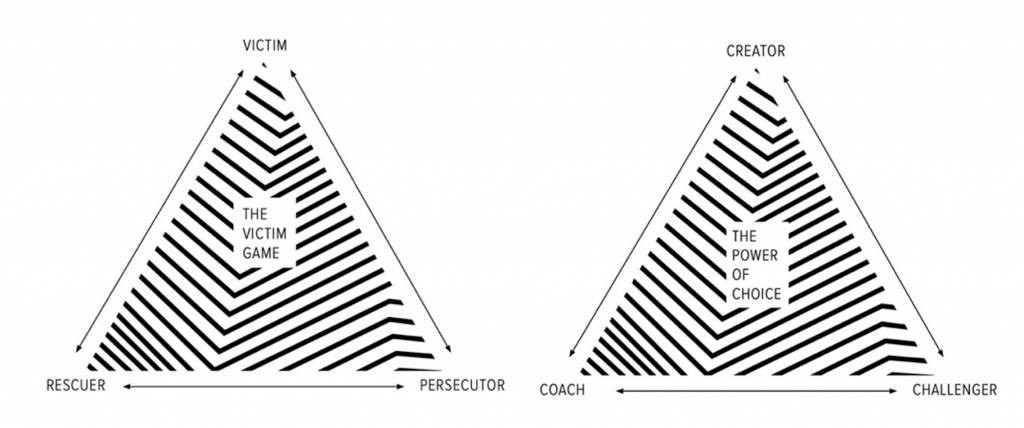How to Quit the Victim Game
Marti Wibbels, MS, LMHC

One of the most popular emotional games played today is known as the Victim Game, but the players usually aren’t even aware this so-called “game” exists. It begins when someone has been victimized—somehow hurt by a person, circumstances, or past or present events. Participants in this game shift in and out of its three roles, changing behaviors, beliefs, and emotions from Victim to Rescuer to Persecutor.
It’s time to quit the Victim Game and make new choices:
- When we see ourselves as a Victim, defined by past or present problems or concerns.
- When we’re in the Rescuer role, doing for others what they can learn to do for themselves.
- When our “story” revolves around being persecuted—or when we’re Persecuting others by our attitudes or actions.
The Victim Game was first brought into awareness by Stephen Karpman, MD, and is sometimes referred to as The Karpman Drama Triangle. When we identify as Victims, it’s easy to focus on feelings and turn our hearts away from God, shifting in and out of the three unhealthy emotional roles. Designed to worship God, we look for something or someone to worship, and it’s deadly when people (especially ourselves) become the focus of our worship.
Now, therefore, fear the LORD and serve Him in sincerity and truth; and put away the gods which your fathers served beyond the River and in Egypt, and serve the LORD. If it is disagreeable in your sight to serve the LORD, choose for yourselves today whom you will serve: whether the gods which your fathers served which were beyond the River, or the gods of the Amorites in whose land you are living; but as for me and my house, we will serve the LORD (Joshua 24:14-15, NASB).
It takes a paradigm shift to move out of the Victim Game. In The Power of TED (The Empowerment Dynamic), David Emerald offers a model with three different roles: Creator, Coach, and Challenger.
- The Creator role was established by God: Be fruitful and increase in number; fill the earth and subdue it. Rule over the fish of the sea and the birds of the air and over every living creature that moved on the ground (Genesis 1:27-28, NIV). Sometimes referred to as the Dominion Mandate, Genesis describes us as remarkably designed in God’s image and able to subdue, rule, or manage a specific domain.
- Sometimes, we need a Coach to encourage us and offer needed advice to help us make healthy choices for ourselves. King David’s prayer in Psalm 61:1-4 (NLT) illustrates a Creator turning from fears to God: O God, listen to my cry! Hear my prayer! From the ends of the earth, I cry to you for help when my heart is overwhelmed. Lead me to the towering rock of safety, for you are my safe refuge, a fortress where my enemies cannot reach me. Let me live forever in your sanctuary, safe beneath the shelter of your wings! We can expect God to deliver us—realizing His answers might be different from what we expect. In Psalm 61, King David asked God to listen, lead, and let him dwell with Him. Like David, we can live as Creators, believing we have daily opportunities to choose to live in freedom while viewing each difficulty as a challenge rather than a persecutor. A Creator trusts God for purpose, peace, and power—and sometimes needs a Coach to help discover new ways to deal with life’s inevitable challenges and concerns.
- When we experience inevitable Challengers, we learn how to face them with dignity and increasing strength. Jesus said, I have told you all this so that you may have peace in me. Here on earth you will have many trials and sorrows. But take heart, because I have overcome the world (John 16:33, NLT).
We recognize earth is a messy place—one where problems exist, where people fail us, and where we can choose hope or hopelessness. We’ll hope when we consistently choose to trust in the LORD. Then, problems become opportunities to grow in Him, not crippling defeat, or persecution. We can face life’s challenges when we determinedly listen for God’s voice. With Paul, we can say, but thanks be to God, who always leads us in triumph in Christ, and manifests through us the sweet aroma of the knowledge of Him in every place (2 Corinthians 2:14, NASB).
You can move beyond the Victim Game when you realize you don’t have to be defined by your feelings; allow God to be your hope. In 2 Corinthians 12, Paul describes his struggle with a "thorn in my flesh." Instead of taking it away, Jesus told Paul, My grace is sufficient for you [My lovingkindness and My mercy are more than enough—always available—regardless of the situation]; for [My] power is being perfected [and is being perfected [and is completed and shows itself most effectively] in [your] weakness (2 Corinthians 12:9-10, AMP).
If you’re unable to manage your emotions, perhaps it’s time to talk with someone. Ask your pastor, priest, or rabbi to recommend professional counselors near you. For additional information, the Victim Game is explained in detail in Chapter Four of Core Healing from Trauma, a biblical counseling workbook available on Amazon. You can also watch “Strengthening Your Core,” a 12-week video series on YouTube.
© 2019 Marti Wibbels | website loved on by Agency O

